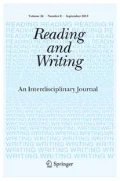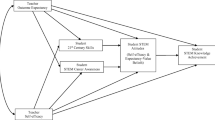Abstract
Despite awareness of the important role of motivation in second/foreign language (L2) learning, a thorough investigation into the motivational influence on the L2 writing processes and products has been neglected. In an attempt to fill this research gap, the present study explored the effects of different types of L2 self-related motivation (ideal and ought-to L2 selves) drawn from the theory of the L2 motivational self system (Dörnyei, 2005) on writing strategy use and writing quality. Sixty-eight Korean undergraduates with a low level of overall English proficiency responded to questionnaires designed to measure their ideal and ought-to L2 selves and writing strategy use. They also completed a descriptive composition task aimed at assessing their writing quality. Regression analyses revealed that the ideal L2 self had a significant positive effect on both planning strategy use and writing outcomes, whereas the ought-to L2 self was merely correlated with revising strategy use. This study provides some empirical support for the potential of an idealized future L2 self-image to become a major determinant of writing processes and products. The results are discussed with reference to a promotion/prevention focus and a sensitivity of the ideal and ought-to L2 selves to positive/negative learning outcomes.
Similar content being viewed by others
References
Anderman, E. M. (1992, 12). Motivation and cognitive strategy use in reading and writing. The annual meeting of the national reading conference, San Antonio, TX.
Chae, S-E. (2011). Contributions of prior knowledge, motivation, strategies to Korean college students’ L2 writing development. Ph.D. thesis, University of Maryland, College Park.
Cho, M. (2015). The effects of working possible selves on second language performance. Reading and Writing, 28(8), 1099–1118.
Csizér, K., & Kormos, J. (2009). Learning experiences, selves and motivated learning behavior: A comparative analysis of structural models for Hungarian secondary and university learners of English. In Z. Dörnyei & E. Ushioda (Eds.), Motivation, language identity and the L2 self (pp. 9–42). Clevedon: Multilingual Matters.
Csizér, K., & Lukács, G. (2010). The comparative analysis of motivation, attitudes and selves: The case of English and German in Hungary. System, 38, 1–13.
Csizér, K., & Tankó, G. (2015). English majors’ self-regulatory control strategy use in academic writing and its relation to L2 motivation. Applied Linguistics, 38(3), 386–404.
Dörnyei, Z. (2005). The psychology of the language learner: Individual differences in second language acquisition. Mahwah, NJ: Erlbaum.
Dörnyei, Z. (2009). The L2 motivational self system. In Z. Dörnyei & E. Ushioda (Eds.), Motivation, language identity and the L2 self (pp. 9–42). Clevedon: Multilingual Matters.
Dörnyei, Z., & Chan, L. (2013). Motivation and vision: An analysis of future L2 self images, sensory styles, and imagery capacity across two target languages. Language Learning, 63, 437–462.
Dörnyei, Z., & Skehan, P. (2003). Individual differences in second language learning. In C. Doughty & M. Long (Eds.), Handbook of second language acquisition (pp. 589–630). Oxford: Blackwell.
Dörnyei, Z., & Ushioda, E. (2009). Motivation, language identities and the L2 self: Future research directions. In Z. Dörnyei & E. Ushioda (Eds.), Motivation, language identity and the L2 self (pp. 350–356). Clevedon: Multilingual Matters.
Förster, J., Higgins, E. T., & Bianco, A. T. (2003). Speed/accuracy decisions in task performance. Built-in trade-off or separate strategic concerns? Organizational Behavior and Human Decision Processes, 90(1), 148–164.
Gardner, R. C. (1985). Social psychology and second language learning: The role of attitudes and motivation. London: Arnold.
Gardner, R. C. (2001). Integrative motivation and second language acquisition. In Z. Dörnyei & R. Schmidt (Eds.), Motivation and second language acquisition (pp. 1–20). Honolulu: University of Hawaii, Second Language Teaching and Curriculum Center.
Gardner, R. C., & MacIntyre, P. D. (1993). A student’s contributions to second-language learning. Part II: Affective variables. Language Teaching, 26, 1–11.
Gupta, D., & Woldemariam, G. S. (2011). The influence of motivation and attitude on writing strategy use of undergraduate EFL students: Quantitative and qualitative perspectives. Asian EFL Journal, 13(2), 34–89.
Hashemian, M., & Heidari, A. (2013). The relationship between L2 learners’ motivation/attitude and success in L2 writing. Social and Behavioral Sciences, 70, 476–489.
He, T.-H. (2005). Effects of mastery and performance goals on the composition strategy use of adult EFL writers. The Canadian Modern Language Review, 61, 407–431.
Higgins, E. T. (1987). Self-discrepancy: A theory relating self and affect. Psychological Review, 94, 319–340.
Higgins, E. T. (1998). Promotion and prevention: Regulatory focus as a motivational principle. Advances in Experimental Social Psychology, 30, 1–46.
Ishikawa, S. (1995). Objective measurement of low-proficiency EFL narrative writing. Journal of Second Language Writing, 4(1), 51–69.
Islam, M., Lamb, M., & Chambers, G. (2013). The L2 motivational self system and national interest: A Pakistani perspective. System, 41, 231–244.
Jong, Y. (2012). Korean students’ perspectives on and use of strategies in English critical writing. English Language Teaching, 24(2), 75–95.
Jung, E-h, & Kim, S.-H. (2003). A study on the motivating factors and the strategy use by different levels of middle school students. Foreign Languages Education, 10(2), 227–250.
Kang, J. Y. (2005). Written narratives as an index of L2 competence in Korean EFL learners. Journal of Second Language Writing, 14, 259–279.
Khaldieh, S. A. (2000). Learning strategies and writing processes of proficient vs. less-proficient learners of Arabic. Foreign Language Annals, 33, 522–533.
Kormos, J. (2011). Task complexity and linguistic and discourse features of narrative writing performance. Journal of Second Language Writing, 20, 148–161.
Kormos, J. (2012). The role of individual differences in L2 writing. Journal of Second Language Writing, 21, 390–403.
Lamb, M. (2012). A self-system perspective on young adolescents’ motivation to learn English in urban and rural settings. Language Learning, 62, 997–1023.
Lee, H.-W. (2002). A study on the relationships between attitudes, motivation, and strategies in learning English. The Journal of English Language Teaching, 14(1), 189–212.
Lee, M.-B. (2005). An investigation into the effects of integrative and instrumental orientations on language learning strategies. English Language & Literature Teaching, 11(1), 37–55.
MacIntyre, P. D., Mackinnon, S. P., & Clément, R. (2009). The baby, the bathwater, and the future of language learning motivation research. In Z. Dörnyei & E. Ushioda (Eds.), Motivation, language identity and the L2 self (pp. 43–65). Clevedon: Multilingual Matters.
MacIntyre, P. D., & Noels, K. A. (1996). Using social-psychological variables to predict the use of language learning strategies. Foreign Language Annals, 29, 373–386.
Marcus, H., & Nurius, P. (1986). Possible selves. American Psychologist, 41, 954–969.
Oxford, R. (1990). Language learning strategies: What every good teacher should know. New York: Newbury House.
Oxford, R., & Nyikos, M. (1989). Variables affecting choice of language learning strategies by university students. The Modern Language Journal, 73, 291–300.
Pae, T.-I. (2009). L2 motivation and writing performance by proficiency level: A process approach to motivation. English Language Teaching, 21(3), 109–127.
Papi, M. (2010). The L2 motivational self system, L2 anxiety, and motivated behavior: A structural equation modeling approach. System, 38, 467–479.
Papi, M. (2016). Motivation and learning interface: How regulatory fit affects incidental vocabulary learning and task experience. Ph.D. thesis, Michigan State University, United States.
Papi, M., & Abdollahzadeh, E. (2012). Teacher motivational practice, student motivation, and possible L2 selves: An examination in the Iranian EFL context. Language Learning, 62, 571–594.
Papi, M., & Teimouri, Y. (2012). Dynamics of selves and motivation: A cross-sectional study in the EFL context of Iran. International Journal of Applied Linguistics, 22, 287–309.
Papi, M., & Teimouri, Y. (2014). Language learner motivational types: A cluster analysis study. Language Learning, 64, 493–525.
Petrić, B., & Czárl, B. (2003). Validating a writing strategy questionnaire. System, 31, 187–215.
Schmidt, R., & Watanabe, Y. (2001). Motivation, strategy use, and pedagogical preferences in foreign language learning. In Z. Dörnyei & R. Schmidt (Eds.), Motivation and second language acquisition (pp. 313–359). Honolulu: University of Hawaii, Second Language Teaching and Curriculum Center.
Taguchi, T., Magid, M., & Papi, M. (2009). The L2 motivational self system amongst Chinese, Japanese, and Iranian learners of English: A comparative study. In Z. Dörnyei & E. Ushioda (Eds.), Motivation, language identity and the L2 self (pp. 66–97). Clevedon: Multilingual Matters.
Teimouri, Y. (2017). L2 selves, emotions, and motivated behaviors. Studies in Second Language Acquisition, 39, 681–709.
The International English Language Testing System. (1992). IELTS general training writing [writing task 2: Band descriptors]. Retrieved March 20, 2018 from https://www.ielts.org/-/media/pdfs/writing-band-descriptors-task-2.ashx?la=en.
Tseng, W.-T., Dörnyei, Z., & Schmitt, N. (2006). A new approach to assessing strategic learning: The case of self-regulation in vocabulary acquisition. Applied Linguistics, 27(1), 78–102.
Van Dijk, D., & Kluger, A. N. (2011). Task type as a moderator of positive/negative feedback effects on motivation and performance: A regulatory focus perspective. Journal of Organizational Behavior, 32(8), 1084–1105.
Vandergrift, L. (2005). Relationships among motivation orientations, metacognitive awareness, and proficiency in L2 listening. Applied Linguistics, 26, 70–89.
Waller, L., & Papi, M. (2017). Motivation and feedback: How implicit theories of intelligence predict L2 writers’ motivation and feedback orientation. Journal of Second Language Writing, 35, 54–65.
Weigle, S. C. (2002). Assessing writing. Cambridge: Cambridge University Press.
Wi, H. J., & Joh, J. S. (2010). The relationships among English learning motivation, learning strategy, and English achievement: A study of Korean high school students. Korean Journal of English Language and Linguistics, 10(4), 807–838.
Yang, E.-M. (2011). Korean college students’ English learning motivation and listening proficiency. English Language & Literature Teaching, 17(2), 93–114.
Author information
Authors and Affiliations
Corresponding author
Additional information
This work was supported by Hankuk University of Foreign Studies Research Fund.
Rights and permissions
About this article
Cite this article
Jang, Y., Lee, J. The effects of ideal and ought-to L2 selves on Korean EFL learners’ writing strategy use and writing quality. Read Writ 32, 1129–1148 (2019). https://doi.org/10.1007/s11145-018-9903-0
Published:
Issue Date:
DOI: https://doi.org/10.1007/s11145-018-9903-0




